Perennial Herbs We Love to Grow that are Perfect for Beginners
Herb growing tipsYou may already know how much we love growing herbs at Sow Right Seeds. And some of our favorite herbs to grow are perennials. When you plant perennial herb seeds, you’ll have a hardy plant that can overwinter in many growing zones or regrow in spring without a lot of attention.
We’ll share our favorite perennial herbs and give you an overview of growing perennial herbs. You can get specific growing details for each herb in our Planter’s Library.

What is a Perennial Herb?
A perennial herb is a plant that comes back year after year. The technical definition of a perennial plant is one that has a life cycle lasting more than two years. Perennial herbs can continue growing year-round in mild climates. In cold climates, they may die back in winter and then regrow in spring.
Why Grow Perennial Herbs?
We love growing herbs so that we always have the freshest ingredients on hand to flavor our food. There are also many health benefits that we enjoy from perennial herbs. Before we delve into the practical aspects of cultivating perennial herbs, let's explore the compelling reasons why you should consider adding them to your garden:
Sustainable Gardening
Perennial herbs are a sustainable gardener's dream. Unlike annuals that need to be replanted every year, perennial herbs come back year after year, reducing the need for constant replanting.
Fresh Flavors Year-Round
Growing your own perennial herbs ensures a steady supply of fresh, aromatic leaves for your culinary adventures. No more relying on store-bought herbs with uncertain freshness! Lovage and Russian Tarragon will add unique flavor to your culinary herb supply.
Health Benefits
Many perennial herbs are not only delicious but also packed with health benefits. From aiding digestion to boosting the immune system, these herbs offer a natural way to enhance your well-being. Roman Chamomile and Hyssop are beneficial herbs with beautiful flowers.
Aesthetic Appeal
Perennial herbs aren't just functional; they're also aesthetically pleasing. Their lush foliage and vibrant flowers can add beauty to your garden while serving a practical purpose. Blue Sage and Bergamot will add foliage and flowers that you can use.
Low Maintenance
Compared to some other garden plants, perennial herbs are relatively low-maintenance. Once established, they require minimal attention, making them an excellent choice for busy gardeners. Add Nettleleaf Horsemint to your landscape without adding extra upkeep.
Popular Perennial Herbs for Beginners
Now that you're convinced of the benefits let's take a look at some perennial herbs that are perfect for beginners:
Lavender
Known for its soothing fragrance, lavender is a hardy perennial herb that's easy to grow. It's perfect for making sachets, herbal teas, and adding a touch of elegance to your garden. With our lavender starter kit and seed-starting tips, even beginner gardeners can grow lavender.
Mint
Mint is a prolific perennial herb that's ideal for novice gardeners. It can be used to make refreshing teas, cocktails, and as a versatile culinary herb. Mint is also an excellent herb for container gardening.
Oregano
Oregano is a robust perennial herb that thrives in well-drained soil and full sun. It's a staple in Mediterranean cuisine and adds a punch of flavor to various dishes.
Chives
Chives are a compact perennial herb with a mild onion flavor. They're perfect for garnishing salads, baked potatoes, and soups. Chives can be planted as companion plants to other vegetables. When they flower, they attract beneficial pollinators and can be part of your perennial flower garden.
Thyme
Thyme is a hardy perennial herb that adds depth to stews, roasted meats, and Mediterranean dishes. It's drought-tolerant and easy to care for.
Choosing the Right Location for Your Perennial Herb Garden
The success of your perennial herb garden begins with selecting the right location. Here are some key considerations:
1. Sunlight
Most perennial herbs thrive in full sun, meaning they need at least 6 hours of direct sunlight daily. Choose a location that receives ample sunlight to ensure healthy growth. When growing perennial herbs, you also need to pay attention to how the sunlight changes throughout the year.
2. Soil Quality
Perennial herbs prefer well-drained soil with good aeration. If your soil is heavy or too full of clay, consider amending it with organic matter to improve drainage.
3. Proximity to the Kitchen
We have our kitchen herb garden as well as our more extensive medicinal herb garden. Plant your culinary herbs close to your kitchen for easy access. This convenience will encourage you to use your herbs regularly in your cooking.
4. Space and Layout
Consider the space you have available and plan the layout of your herb garden accordingly. Raised beds, containers, or interplanting with other garden crops are all viable options.
5. Hardiness Zone
One thing to keep in mind is that only some herbs are true perennials in every growing zone. There are some locations where freezing temperatures will kill the roots. Sometimes, choosing a place close to the house or a sheltered spot will provide enough protection. Covering with straw mulch and other coverings can also moderate temperatures.

Seed Starting Tips for Perennial Herbs
-
We start most of our seeds indoors. This allows us to control the temperature and growing conditions to create the optimal germination environment.
-
Some perennial seeds, such as lavender and catnip, need cold stratification to germinate. Planning ahead will ensure that your seeds are ready to plant.
-
Know your last estimated frost date so you can count back and start your seeds early enough to be the right size for transplanting outdoors when the weather is right.
Use grow lights placed close to the seedlings to encourage healthy growth and prevent spindly seedlings.

Transplanting Perennial Herbs
When seeds have been started indoors, they need a transition period to get them used to life outdoors. Over the course of a week or two, you can toughen up your seedlings gradually so that they don’t suffer from transplant shock.
Prepare the garden soil with well-rotted compost and transplant seedlings to the depth that the plants were already growing.
Tips for Growing Perennial Herbs
Watering
Water your herbs deeply and consistently, ensuring the soil remains evenly moist but not waterlogged.
Mulch around your plants to help retain soil moisture and reduce weed growth.
Once perennial herbs are established, many can tolerate dry spells. However, keeping the soil moist will result in consistent growth and less plant stress.
Fertilizing
As a general rule, herbs don’t need extra fertilizer. In fact, many herbs will not be as flavorful if they grow too quickly from added fertilizer.
In the spring, you can use a balanced, slow-release fertilizer or compost to provide essential nutrients to your herbs.
Pruning
Regularly trim your herbs to encourage bushier growth and prevent them from becoming leggy.
Never remove more than ⅓ of the plant at a time.
Harvesting
Harvesting year-round is the beauty of growing perennial herbs. You can take a sprig of rosemary whenever you need it.
Harvest leaves and stems in the morning when the essential oils are at their peak.
Use sharp scissors or shears to make clean cuts and avoid damaging the plant.

Maintaining Perennial Herb Gardens Throughout the Seasons
Perennial herbs require care throughout the year to thrive in different seasons:
Spring
- In spring, monitor for new growth and prune any dead or damaged parts.
- Apply a light layer of compost or organic fertilizer.
Summer
- Ensure consistent watering during hot and dry periods.
- Watch for pests and diseases and take action as needed.
Fall
- Continue to harvest herbs, but leave some growth for winter protection.
- Mulch around the plants to insulate the roots during winter.
Winter
-Monitor plants and protect them if needed from extreme cold.
-Trim back your herbs in late winter or early spring to encourage new growth.
Common Pests and Diseases in Perennial Herb Gardens
Despite their hardiness, perennial herbs can still fall prey to pests and diseases. Be on the lookout for these common issues:
Aphids
These tiny, sap-sucking insects can cause curling leaves and stunted growth. There are several ways to get rid of aphids without toxic chemicals. You can use insecticidal soap or introduce natural predators like ladybugs to control them.
Slugs and Snails
These slimy pests can munch on your herb leaves overnight. Set up traps or use natural deterrents to keep slugs and snails from destroying your plants. Some herbs, such as lavender, sage, and rosemary, are a natural deterrent to these creatures.
Powdery Mildew
Powdery mildew appears as a white, powdery substance on leaves. Improve air circulation and use a fungicidal spray to combat this fungal disease.
Preserving Your Harvested Herbs
While fresh herbs are best, you can also dry and freeze them. Having large amounts of dried herbs on hand can be helpful for making tea and herbal remedies.
Drying
-Hang herbs in bundles or use a dehydrator to dry them for long-term storage.
-Store dried herbs in airtight containers in a cool, dark place.
Freezing
- Chop herbs and freeze them in ice cube trays with water or olive oil for convenient use in cooking.
Start Growing Perennial Herbs!
From classic favorites like rosemary and thyme to lesser-known varieties such as lovage and lemon balm, you’ll enjoy growing perennial herbs.
You can enjoy the benefits of perennial herbs year-round by choosing the right herbs, providing the proper care, and learning to preserve your harvest. Get started today, and watch your perennial herb garden flourish, providing you with fresh flavors and fragrances for years to come.




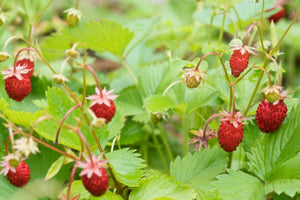
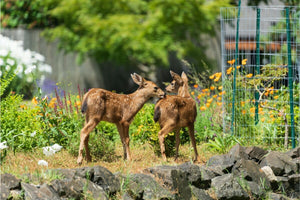
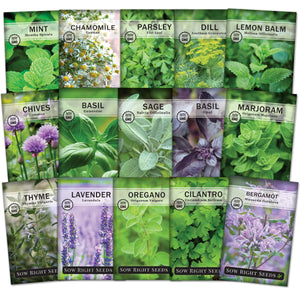
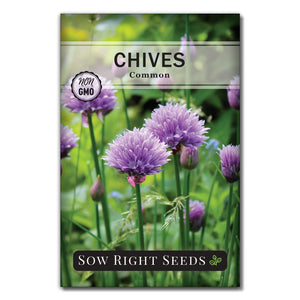
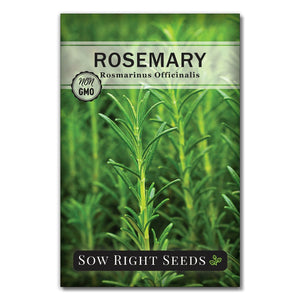
Leave a comment